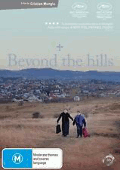
Romania/Belgium/France 2012
Directed by
Christian Mungiu
152 minutes
Rated M
Reviewed by
Sharon Hurst

Beyond The Hills
Synopsis: Alina (Cristina Flutur) and Voichita (Cosmina Stratan) grew up together in the same orphanage and were best of friends and, most likely, even lovers. Now adults, Alina seeks out her former beloved only to find that Voichita has joined an Orthodox convent in a remote mountain area. Whereas Alina wants them to run away together, Voichita wishes to draw her friend into a life devoted to Christ. As the already unstable Alina tries more and more strategies to force Voichita’s hand, the nuns and head priest (Valeriu Andriuta) at the convent start to believe Alina is possessed by the devil.
This inexorably slow, but rivetingly fascinating film is based upon a true criminal case in Romania in 2005 in which a nun was bound to a cross and gagged as part of an exorcism ritual. The young woman was found dead three days later whilst the supervising priest incurred a 14-year jail sentence. The plot of the film obviously takes liberties with the actual facts but the underlying issues remain the same – how are religion and secularism to be reconciled in a modern world and how can the church justify treating mental illness as “possession”?
The films of director Mungiu are perhaps driven by his country’s emergence from an oppressive communist regime. In 4 Months, 3 Weeks, 2 Days he deals with female friendship in the context of illegal abortions, and here again female connections are explored, but within the context of Romanians flocking back to the church after religious observance was decriminalised. Although Romania is supposedly limping into the modern world, the church retains its superstitions and blind allegiance to ritual and dogma. The film depicts the nuns and the head priest, known as Papa to his flock, as almost coming from the Middle Ages. They show compassion to the local villagers but are completely unable to rationally evaluate the situation in which they find themselves.
The tension between the religious dogma and reason is exacerbated by the Alina/Voichita relationship. The push and pull between the girls is gruelling with Voichita stoically and calmly repeating her religious mantras to Alina while Alina becomes more and more desperate and manipulative in her determination to resurrect the one-time passion between them. Because the character of Alina is portrayed as somewhat unlikeable and because she becomes progressively violent, the audience is almost lured into sympathising with the hard-line stance of the convent, yet any nascent sympathies for their well-meaning intentions are undermined by the ghastly ending.
The contrasting performances by the two leading actresses are powerful whilst the unsettling paradox of the supposed humanity of the priest and nuns contrasted with their self-righteous brutality is shocking in its consequence. The cinematography relies on stark greys and whites and a minimum of colour, embodying the harshness of life during the mountain winters and the spartan rigour of the convent itself.
Beyond The Hills deservedly won a Best Actress award for both women at Cannes, a screenplay award for Mungiu and a Palme d’Or nomination. The sad fact is, however, that because of its lengthy running time and the nature of its subject matter this is a film that will probably fare better with critics than with audiences. But if you’re up for an immersive and unsettling experience, give it a go.

Want more about this film?


Want something different?




